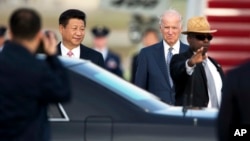Chinese President Xi Jinping, on his second day Friday of a state visit in Washington, will be treated to full honors, including a 21-gun salute, a formal summit, a joint news conference with President Barack Obama and a black tie state dinner.
Vice President Joe Biden led the welcoming delegation as Xi's plane touched down at Joint Base Andrews on the second leg of a week-long trip that began in Seattle, where the Chinese leader sought to reassure U.S. companies that he is working to create a more favorable investment climate in his country.
Later, President Obama hosted Xi at a private working dinner, where White House aides said they would begin grappling with the main issues that divide their countries.
On Friday, Xi will be treated to full honors, including a 21-gun salute, a formal summit, a joint news conference and a black tie state dinner.
U.S. officials earlier said cyber security is expected to be a focal point in talks between the U.S. and Chinese presidents.
State Department spokesman John Kirby said, “We continue to have serious concerns about China’s practices in the cyber realm and that is probably not going to be abated anytime soon.”
President Obama has said he is considering U.S. sanctions against China in response to attacks.
Cyber attacks are among the "difficult issues in the U.S.-China relationship" that 26 Congress members are urging Obama to take up in talks with Xi. In a letter Monday, the representatives urged the president to directly address "pressing areas of disagreement."
Fingerprints Stolen
On Wednesday, the U.S. Office of Personnel Management said a further investigation into the data breach reported earlier this year revealed that more than 5.5 million fingerprint records were stolen, five times as many as first thought.
U.S. officials have not accused China of the breach. However, U.S. investigators have told reporters privately that they believe the Chinese government is responsible.
U.S. business leaders are seeking personal assurances from President Xi that their companies will be treated fairly when they do business in China, and that Beijing will scale back its alleged large-scale cyber theft of commercial secrets that has cost American companies billions of dollars in recent years.
“China and the United States have had a late and feeble start to consultations on what to do about managing the rules of cyberspace,” said Carnegie Endowment for International Peace analyst Douglas Paal in an Op-Ed for China Daily.
South China Sea
Another area of disagreement expected to be discussed is China's controversial territorial claims in the South China Sea.
Most pressing is China's island-building efforts in the Spratly Islands chain, parts of which are also claimed by the Philippines, Vietnam, Malaysia, Brunei and Taiwan.
“We do not take positions on claims,” said Kirby.
But he added, “It is unhelpful for the status quo to be changed in an overt manner, whether it is through reclamation or militarization of reclaimed land.”
The U.S. has demanded China stop those activities, calling them out of step with international norms and a risk for sparking conflict in the region.
Earlier this week, Xi told The Wall Street Journal that the Spratly Islands have been Chinese territory since ancient times.
Human rights
China's human rights record is another source of friction, and several rights groups are urging President Obama to not shy away from the issue during his meetings with President Xi.
"It's a big and complicated relationship, and so there are a lot of topics vying for attention," acknowledged Sophie Richardson, China director at Human Rights Watch. "But we certainly think that the deterioration of the rights situation in China under Xi merits special attention."
When the Chinese leader spoke Tuesday in Seattle, dozens of protesters gathered to condemn what they see as Beijing's harsh policies in Tibet and its crackdown against other political dissidents.
Xi also is likely to experience protests in Washington and in New York, where he plans to address the U.N. General Assembly.
Cooperation
Despite the multitude of disagreements, one area of cooperation expected to be highlighted by the two leaders is climate change.
During Obama's visit to Beijing last year, the two countries agreed to reduce climate change-causing greenhouse gas emissions. The agreement was seen as a landmark moment for the world's two worst polluters.
The two sides also will attempt to find common ground on how to deal with North Korea, which is continuing to advance its nuclear weapons program and is threatening to carry out a satellite launch, which many say is a disguised long-range missile test.




